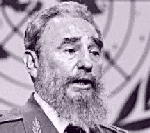
< Previous Page * Next Page >
Meanwhile, an example of communist tactics was being unfolded in Cuba, within 90 miles of the U.S. southeastern shoreline. Early in 1959, after battling for several years,
 |
| Fidel Castro |
American sympathy rapidly evaporated, however, when Premier Castro began to act and sound like a communist dictator. He failed to hold the free elections he had promised the Cuban people. He put to death hundreds of his former political enemies in hasty trials intended more as propaganda than as judicial proceedings. Then he proceeded to fill Cuba's jails once more with political critics, including many of Castro's former comrades, anti-communist labor leaders, and other veteran opponents of the Batista regime. The press was placed under strict censorship. Foreign-owned property was expropriated arbitrarily without fair compensation, and in many cases without any compensation at all. Only the communists emerged unscathed from Castro's repressive and vindictive actions.
As his internal dictatorship hardened, Castro began increasingly to denounce the United States and to seek support from the communist bloc nations. In the face of rising provocations, the Eisenhower administration at first adopted a policy of patient waiting. During the summer of 1960, however, American policy stiffened. The United States placed a temporary embargo on the purchase of Cuban sugar and urged the 21-nation Organization of American States (OAS) to condemn Cuba's actions. The OAS, while it did not directly criticize the Castro regime on this occasion, did condemn communist interference in the Western Hemisphere.
Another international gathering, held later in 1960, seemed to sum up the hopeful and disturbing aspects of the world scene. Meeting in New York, the U.N. General Assembly admitted 16 new nations, all but one from the African continent, a reflection of the rapid postwar movement of formerly colonial peoples to full independence and nationhood. In a speech to the U.N. delegates, President Eisenhower asked other nations to join the United States in providing increased aid to developing areas generally and to the new African nations in particular. He also pledged that the United States would continue to seek a workable program of world disarmament based on an effective system of inspection and control.
Prior to the General Assembly session, world concern over the mounting arms race had been heightened by man's conquest of space, a development which in more tranquil times would have been a source only of admiration and pride. The launching of the first Soviet space satellite in October 1957, and the first American satellite in January 1958-followed by many others-demonstrated that both countries now had rockets powerful enough to hurl atomic and hydrogen bombs into the heart of an enemy country thousands of miles away. In the absence of a foolproof arms inspection system, there was always the danger that, accidentally or otherwise, a push-button war might break out which could destroy millions of lives in a single blinding instant. World opinion was therefore shocked and disheartened when Premier Khrushchev told the U.N. General Assembly in belligerent tones that the Soviet Union would not accept inspection and control in the initial stages of a disarmament agreement. Soviet leaders knew that disarmament without inspection was unacceptable to the democratic nations, since it would give dangerous advantage to a closed society like the Soviet Union which could violate its disarmament pledges with little chance of being found out, whereas violations within a democracy would have a high chance of being discovered and publicized.
< Previous Page * Next Page >